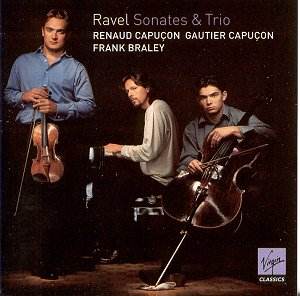Having some of Ravel's major and most inspired chamber music
on one disc played by such a winning combination of youth and musical
insight is a treat indeed. Add to this Virgin Classics' spacious yet forward-placed
and well-balanced recording and the result is a recording to cherish.
All three protagonists on this record are young, and
a sense of vitality and freshness pervades the entire experience. If
pushed, I would highlight the pianist, Frank Braley, who seems to have
myriad tonal resources at his disposal; but that would be to underplay
the achievement of the Capuçon brothers (and that would never
do!).
Ravel's Piano Trio of 1914 receives a magical reading.
The second movement exudes a Spring-like freshness, its rhythms infectious
and a joy to listen to; the third movement is broad and tender, while
the Capuçons and Braley bring out the 'orientalisme' of the finale.
They also succeed in the none too easy task of conveying Romantic ecstasy
without going hopelessly over the top.
Renaud Capuçon impressed many people with his
disc of French Works for Violin and Orchestra (Virgin Classics VC5 45482-2).
He gets his chance to shine in the Violin Sonata in G, a piece premiered
in 1927 by Georges Enescu. Enescu reportedly took a dislike to the work.
It is difficult to see why, especially in such a persuasive performance
as the present one. The players demonstrate great attentiveness to the
text in tandem with exemplary control of their instruments: listen to
Capuçon's beautifully held high notes, for example. Predictably,
perhaps, the 'Blues' movement is a great success. This is young person's
music, and this performance shows a great amount of wit.
The Sonata for Violin and Cello has never been one
of Ravel's more popular works. This performance will make you ask why
this is so. The Capuçons ensure that the interplay of lines remains
ever-fascinating. The technical difficulties of the second movement
('Tres vif’) pose no problems to either player: if anything, the performance
simply grows in stature as it progresses. The finale is marked 'Avec
entrain' (with spirit), and this it has in abundance.
The posthumously-published Violin Sonata dates from
1897, but did not appear in print until 1975. It is a delicate piece,
and a daring way to end the disc (it closes hanging in the air, like
so many of Ravel's perfumed statements). The recording balance throughout
this issue is well-nigh ideal.
A very, very special disc indeed.
Colin Clarke


